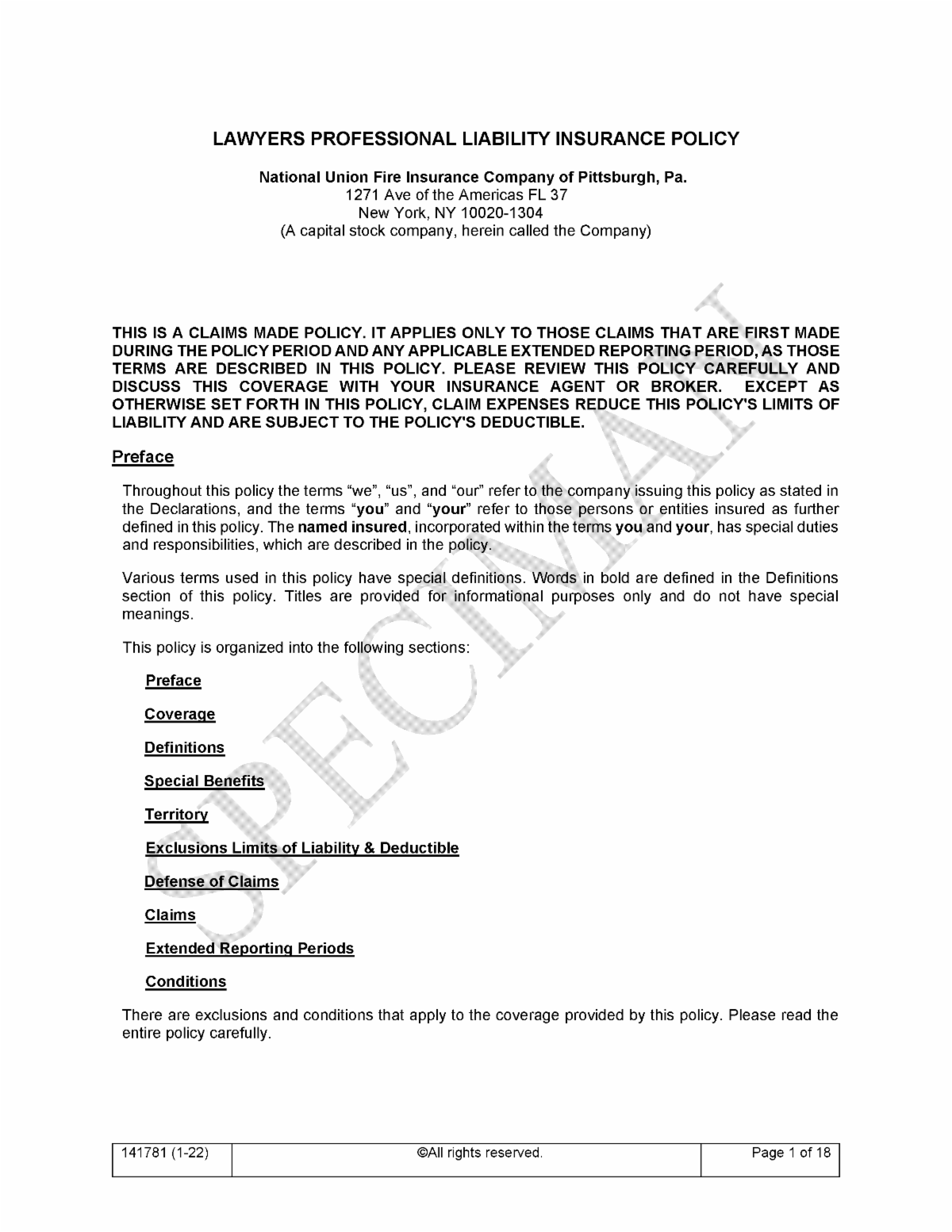
Attorney Malpractice Insurance Policies are claims-made and reported policies. When the coverage ends the ability to report claims for past acts ends at policy termination. Attorneys leaving private practice via retirement, becoming a judge or working in the private or public sector need to protect their past acts. Insurers will not renew attorney malpractice policies for attorneys that are no longer in private practice. Given this it is important for attorneys to protect their past acts once coverage ends. For solo practitioners and small firms that may close once the practitioner leaves, the nonpracticing Extended Reporting Period Endorsement/Retirement Tail (ERP) may be an answer.
Note: For attorneys closing or leaving their small firm to work at another law firm the nonpracticing Extended Reporting Period Endorsement/Retirement Tail (ERP) is not an option. Coverage for their past acts is outside of the scope of this blog.
Each insurer’s policy differs on requirements and wording for obtaining this valuable ERP endorsement at no or reduced cost. Careful planning by the attorney may save the attorney thousands of dollars. The ability to request an ERP differs by insurer but is time sensitive. Regardless of the insurer, the attorney must completely stop private practice to obtain the nonpracticing ERP.
The AIG policy provides a nonpracticing ERP based on the following policy language:
IX. Extended Reporting Periods
This section of the policy sets forth the extended reporting periods that may be available to you under this policy. No extended reporting period shall be construed to be a new policy and any claim submitted during an extended reporting period shall be subject to the policy’s terms and conditions except as specifically set forth below. All claims made during an extended reporting period must be reported in accordance with the provision entitled Notice of Claims.
3. Non-practicing Extended Reporting Period.
a. Limitation. For those of you who do not qualify for an unlimited non-practicing extended reporting period at no additional charge, the non-practicing extended reporting period as set forth herein shall not begin until after expiration of this policy period, any renewal of this policy in a series of successive renewals, or any optional extended reporting period.
b. Eligibility
i. Death and Disability
Those of you who are affiliated with the named insured as a lawyer (other than “of counsel”, independent contractor or per diem lawyers) who during the policy period die or become totally and permanently disabled will be automatically provided with an extended reporting period for an unlimited period of time at no additional premium.
ii. Retirement
Those of you (other than independent contractor or per diem lawyers) who, during the policy period, retire, or otherwise cease the private practice of law, have the option to purchase an extended reporting period as set forth below. The additional premiums, set forth below, are a percentage of the full annual premium of this policy. Each of you electing this extended reporting period must pay your prorate percentage of the full indicated percentage.
Option Additional Premium
1 year 100%
2 years 135%
3 years 150%
5 years 185%
Unlimited 225%
However, if you (other than independent contractor or per diem lawyers):
(a) retire or otherwise cease the private practice of law during the policy period and have been insured under a Lawyers Professional Liability Policy in the Aon Attorney’s Advantage program, whether insured by us or the immediate prior insurer, continuously for the last three, full years; or
(b) retire or otherwise cease the private practice of law during the policy period and have been insured under a Lawyers Professional Liability Policy in the Aon Attorney’s Advantage program, whether insured by us or the immediate prior insurer, continuously for one full year plus the previous three full years under a Lawyers Professional Liability Policy with a single prior insurance company
then you (other than independent contractor or per diem lawyers) will be provided with an extended reporting period for an unlimited period of time at no additional charge. Upon election of a non-practicing extended reporting period, the entire premium therefor shall be deemed fully earned. The non-practicing extended reporting period shall not be cancelable.
iii. Your right to a non-practicing extended reporting period must be exercised by notice in writing not later than sixty (60) days after the date you die, become totally and permanently disabled, retire or otherwise cease the private practice of law. Such notice must indicate the total extension period desired, if applicable, and must include payment of any amounts due us, if any, for such non-practicing extended reporting period. The non-practicing extended reporting period shall be endorsed hereto.
If such notice is not timely given to us, you will be deemed to have waived the right to a non-practicing extended reporting period.
c. Non-practicing Extended Reporting Period Limits of Liability.
For those lawyers who are eligible for an unlimited non-practicing extended reporting period at no additional charge, the limits of liability available for each claim and all claims in the aggregate are part of and not in addition to the limits of liability on the Declarations for the policy in effect when they became eligible, regardless of the number of you who are eligible for such extended reporting period or who are insured under this policy.
With respect to those lawyers who retire or otherwise leave the private practice of law and who elect a non-practicing extended reporting period, for which payment is required, our limits of liability for claims made during any non-practicing extended reporting period shall be equal
to the limits of liability set forth in the Declarations for this policy and shall apply separately to each of you who make such election.
The deductible and deductible provisions of this policy will be waived with respect to claims first made against you during the non-practicing extended reporting period.
II. DEFINITIONS
9. Extended reporting period means the designated period of time after the cancellation or nonrenewal of the policy period for reporting claims to us that are made against you during such period of time, provided that such claims arise out of wrongful acts that first take place on or after the retroactive date and before the end of the policy period.
23. Totally and permanently disabled means that you have become so disabled as to be wholly prevented from performing professional legal services, provided that such disability:
a. has existed continuously for more than six (6) months; and
b. is expected to be continuous and permanent;
as determined and documented by your licensed treating physician. However, totally and permanently disabled shall not mean any condition which occurred:
a. as a result of war or acts of war, whether or not declared; or
b. during active service in the armed forces of any country.
25. “You” means the named insured and the persons or entities described below:
a. any lawyer, partnership, limited liability partnership, professional corporation or professional association, limited liability company or limited liability partnership who:
i. as of the inception date of the policy, is a partner, officer, director, stockholder-employee, associate, manager, member or employee of the named insured;
ii. after the inception date of the policy and prior to its termination, becomes a partner, officer, director, stockholder-employee, associate, manager, member or employee of the named insured;
iii. was previously affiliated with the named insured as a partner, officer, director, stockholder-employee, associate, manager, member or employee of the named insured;
iv. is acting as “of counsel” to the named insured; or
v. is acting as an independent contractor or on a per diem basis to the named insured; but only for professional legal services performed on behalf of the named insured during the time of such affiliation. Those of you who qualify for and elect a non-practicing extended
reporting period shall be considered within the definition of you only as an individual, as set forth above; and
b. each nonlawyer employee who was, is, or becomes an employee of the named insured, but only while acting within the scope of employment on behalf of the named insured at the time of such employment.
Switching insurers near retirement to save a few dollars may cost an insured attorney thousands of dollars to buy the same protection. Planning retirement or a transition out of private practice should be discussed with your malpractice insurance agent prior to ending private practice when possible.
CLICK HERE TO OBTAIN AN ATTORNEY MALPRACTICE QUOTE

Lee Norcross, MBA, CPCU
(616) 940-1101 Ext. 7080